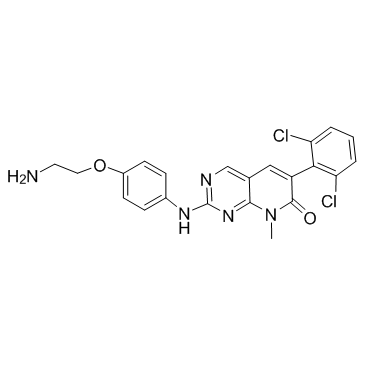212391-58-7
| Name | PP58 |
|---|---|
| Synonyms | 2-{[4-(2-Aminoethoxy)phenyl]amino}-6-(2,6-dichlorophenyl)-8-methylpyrido[2,3-d]pyrimidin-7(8H)-one |
| Description | PP58 is a pyrido[2,3-d]pyrimidine-based compound that inhibits PDGFR, FGFR and Src family activities with nanomolar IC50 values. |
|---|---|
| Related Catalog | |
| Target |
PDGFR |
| In Vitro | PP58 inhibits Src with a subnanomolar IC50 value in the assays. PP58 behaves as a titration reagent at higher Src protein concentrations. As analyzed by immunoblotting with specific antiserum, the PP58 matrix specifically depletes Src from total lysate, whereas binding to the PP58 beads is prevented when free inhibitor is included. The ectopically expressed FGFR1 receptor tyrosine kinase is specifically retained on PP58 beads. PP58 matrix could be a novel affinity reagent for the purification of cellular pyrido[2,3-d]pyrimidine inhibitor targets. PP58 affinity chromatography leads to the identification of protein kinases belonging to various different groups and families, indicating that the pyrido[2,3-d]pyrimidine inhibitor is not selective for a set of phylogenetically related members of the human kinome. The Ki values of PP58 for p38α and JNK2 are 3.8±1.9 nM and 0.32±0.04 μM, respectively. PP58 affinity matrix also serves as an efficient purification reagent for a variety of protein kinases, which lack this structural feature and have much lower affinities for the pyrido[2,3-d]pyrimidine inhibitor PP58. PP58 inhibits anisomycin activated p38 in a dose-dependent manner with an IC50 below 10 nM. LPS-stimulated TNF-α production is potently inhibited by PP58 with a cellular IC50 value of around 3 nM[1]. The T341M mutation abrogates the sensitivity to PP58 inhibition by increasing the cellular IC50 value of about 10 nM by more than 1000-fold. The cellular wild-type FGFR1 activity is potently inhibited by low nanomolar concentrations of PP58, whereas dramatic resistance formation is detected for the FGFR1-V561M mutant. PP58 inhibits CSK activity with an IC50 value of around 100 nM[2]. |
| In Vivo | PP58 can exhibit some degree of selectivity at low nanomolar concentrations in vivo[1]. |
| Kinase Assay | MEK1 and Aurora A activities are tested at 37 °C in a total volume of 30 μL. The kinases are assayed using 50 μM ATP and 1 μCi [γ-32P]ATP in the presence of different PP58 concentrations. Kinase substrate proteins included are 0.25 mg/mL inactive GST-ERK2 for MEK1 and 0.025 mg/mL kemptide for Aurora A, respectively. Reactions are stopped by addition of SDS sample buffer. Determination of IC50 [0–100%] values is performed using GraFit software[1]. |
| References |
| Density | 1.4±0.1 g/cm3 |
|---|---|
| Boiling Point | 663.7±65.0 °C at 760 mmHg |
| Molecular Formula | C22H19Cl2N5O2 |
| Molecular Weight | 456.325 |
| Flash Point | 355.2±34.3 °C |
| Exact Mass | 455.091583 |
| LogP | 2.93 |
| Vapour Pressure | 0.0±2.0 mmHg at 25°C |
| Index of Refraction | 1.681 |
| Storage condition | 2-8℃ |
